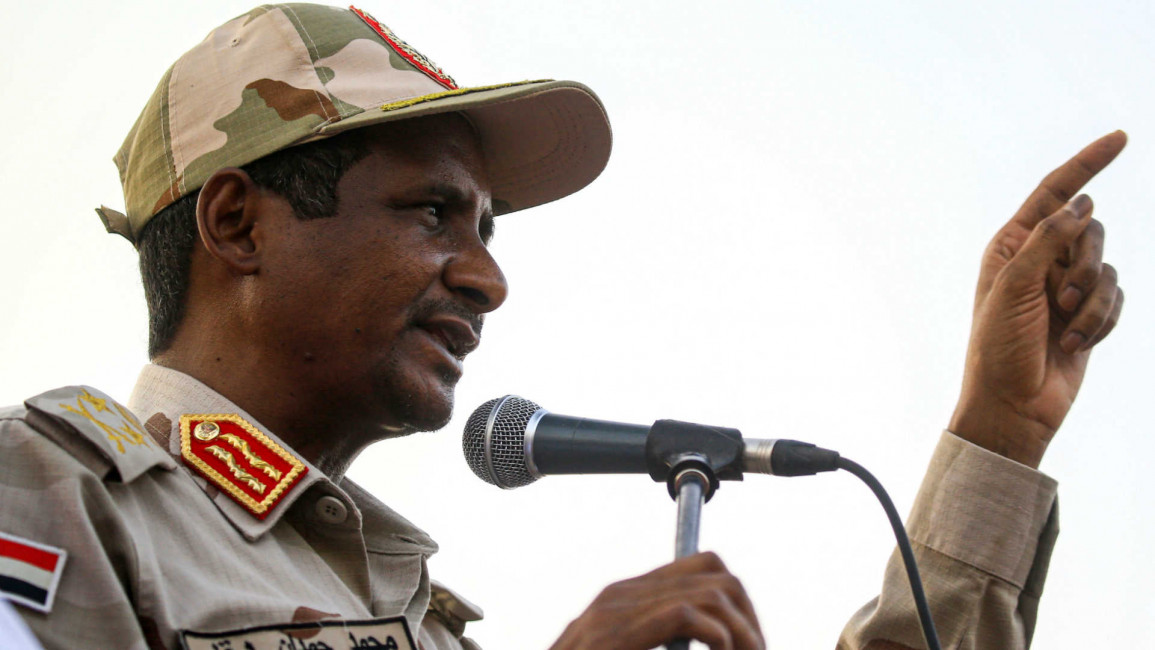Sudan general blamed for brutal massacre says those responsible will be sent to the 'gallows'
"We are working hard to take those who did this to the gallows," deputy leader Mohammad Hamdan Daglo said on Sunday in a speech broadcast on state television.
"Whoever committed any fault" will be held accountable, he added.
Dagalo, known by his nickname Hemedti, is widely seen by protesters to be responsible for the bloody crackdown.
Hemedti is also the commander of the Rapid Support Forces (RSF) - an officialised offshoot of the Janjaweed militias, notorious for their role in alleged war crimes and genocide in the Darfur conflict - which protesters say led the raid on a thousands-strong Khartoum sit-in on the last day of Ramadan.
As Janjaweed forces stormed the sit-in, they are accused of having brutally beaten protesters, raped demonstrators and doctors, looted stores and civilians and shot dozens of people dead.
At least 40 bodies of those murdered at the vast sit-in site were thrown into the river Nile, many of them weighed down in an apparent attempt to hide the extent of the massacre, the Central Committee for Sudanese Doctors (CCSD) said.
The crackdown continued for days as Janjaweed forces roamed the city.
At the same time, the ruling military junta closed off Sudan from access to the internet, a measure still being imposed almost two weeks later.
The military junta has been trying to establish a narrative of "infiltration" to explain the violent dispersal of the sit-in.
In the immediate wake of the violence, the generals pinned the violence on "infiltrators" from an area close to the sit-in site, dubbed "Colombia" and known as a hotbed for alcohol and drug use.
Since then, the junta have elaborated on this theory, expounding warnings of men taking up arms and heading for the capital, and showing a New York Times reporter a booty of liquor, condoms and guns allegedly confiscated from demonstrators.
Hemedti, in an interview with The New York Times, claimed demonstrators had "provoked" soldiers with actions such as revealing their private parts.
Military junta spokesman Shams al-Deen al-Kabbashi on Thursday denied the military had ordered the massacre, instead claiming it had planned the clearance of the "Colombia" area only.
Brigadier Abderrahim Badr al-Deen, spokesman for an investigative committee into the crackdown set up by the junta, claimed initial findings showed "officers and soldiers of different ranks from [the] regular forces entered the sit-in without any orders from their superiors".
Those troops, he said, were not those who had been ordered to clear the "Colombia" area.
Sudanese protesters have been quick to dismiss those claims, insisting that the evidence of who dispersed the sit-in and how is clear.

![Members of the Algerian delegation threw roses into the Seine [Getty]](/sites/default/files/styles/image_330x185/public/2024-07/GettyImages-2162980872.jpg?h=199d8c1f&itok=h_3o_TOL)

![The Libyans were arrested at a farm in Mpumalanga province east of Johannesburg [Getty]](/sites/default/files/styles/image_330x185/public/2024-07/GettyImages-2162903568.jpg?h=199d8c1f&itok=4Qzg79i1)